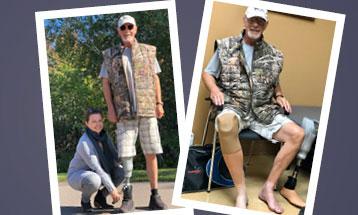From protecting Canadians to turtles

Ostler rescues a Northern Map Turtle from a dry dock.
Well, maybe not that slow. The 61-year-old still runs about 20 kilometers a week and hits the pavement every weekend with the “Sunday morning Champs” running club. The Army Veteran is also the Nest Box Protection Coordinator with the conservation organization “Turtles Kingston.” The group makes and sells boxes covered with wire mesh that protect the delicate nests of Ontario’s eight at risk turtle species from predators. With the support of Veterans Affairs Canada’s Education and Training Benefit, he plans to go back to the Royal Military College to study Environmental Science, and specialize in wildlife conservation and sustainability -- specifically to learn more about the turtles he’s been volunteering his time to protect.
“Turtles are very important little creatures that keep our wetlands clean,” Ostler explains. “They have lived and endured virtually unchanged for thousands of years. We have to do our part to save them from extinction.”
Ostler is an avid nature photographer, you can check out pictures of his conservation work on Instagram @nature_jameso
His military career

Ostler releases a snapping turtle into the wild.
Before he was protecting turtles, Ostler protected Canadians as a member of the Royal Canadian Dragoons. He served as a Tanker/Armour Corps in Lahr, West Germany, at CFBs Gagetown, Petawawa and Kingston, and completed peacekeeping missions in Bosnia, Israel and Palestine and in the Sinai Peninsula, before retiring from the Canadian Armed Forces in April 2017.
As all Veterans know, service takes its toll. Ostler has received Disability Benefits for tinnitus, lower back issues and skin cancer on his ear - all attributable to his outdoor field time and training operations in a tank.
'Crew Commanding armoured vehicles can be very rough on your body. Lots of shaking and jarring as you move across country over many types of challenging terrain in all weather conditions,” Ostler explains.
“Wearing a PPE helmet, and a Crew Helmet for 10 hours a day at times puts a lot of strain on the neck and back. The tinnitus is due to lots of loud sound exposure. Many 105 mm Tank rounds fired - many 76 mm rounds fired from our Cougars - particularly during our Bosnia tour with the 1 RCR Battle Group.”
Getting help

Ostler holds a snapping turtle hatchling the size of a toonie which will grow to be about 40 pounds in six years.
Ostler advises Veterans to ask for help if they feel overwhelmed. “The support of Veterans Affairs Canada has been vitally important for me. It’s good to have a department to continue to take care of you after you dedicated your entire working life to the Canadian Armed Forces. It’s good to have the support as you continue to move forward.”
He also wants Veterans to know there is help available when applying for support with Veterans Affairs. “As a former officer with good writing skills it was easier for me to write up these claims than it might be for others,” he explained, adding the Royal Canadian Legion offers support for this.
The staff at any Veterans Affairs Canada office, Canadian Armed Forces Transition Centre or Service Canada office can assist you or call us at 1-866-522-2122. Service Officers with The Royal Canadian Legion or The War Amps of Canada can also assist you with your application, including helping you get all of the information you need to support your application. Their assistance is free of charge.
In addition to disability benefits, Ostler has accessed the Veterans Independence Program which gives him financial support for yardwork, lawn cutting and snow removal. “It’s an excellent program and greatly appreciated. I am a happy, satisfied customer,” he said.
If you or someone you know is struggling with the transition to life after service, check our website for services related to mental and physical health, finances, education or jobs and housing and home life. We also provide services to families and caregivers who support our Veterans.



